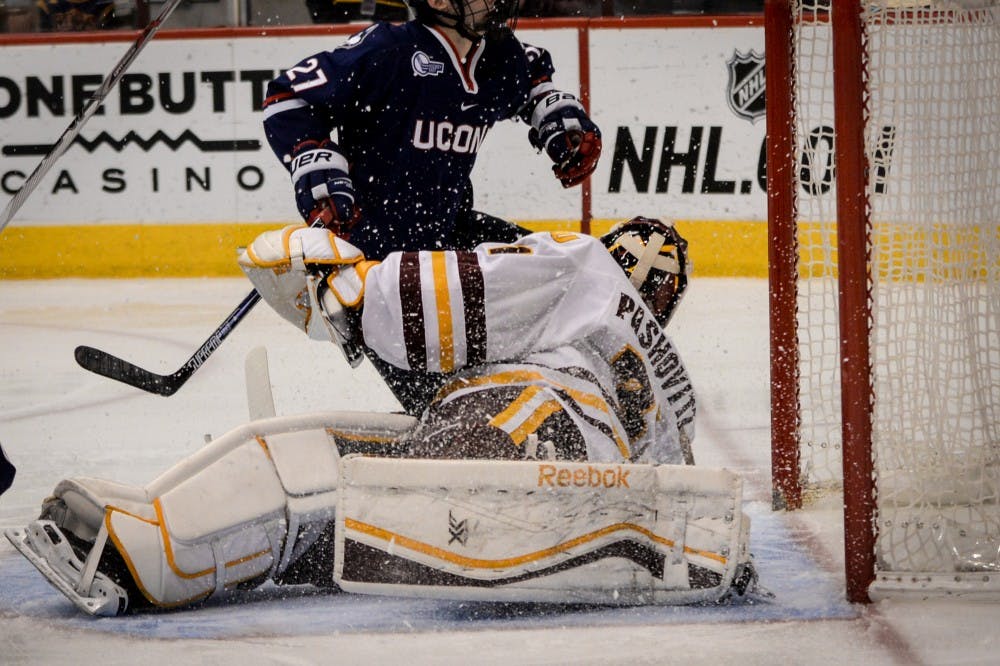Ryland Pashovitz, a freshman and ASU's first goaltender NCAA commitment, quickly became head coach Greg Power’s “go-to guy.” Ending the season with a .900 save percentage, Pashovitz reflected on his first NCAA season.
Prior to joining the Sun Devils this season, Pashovitz dominated the Saskatchewan Junior Hockey League. He held the record for best goals allowed average (1.60), best save percentage (.948) and the SJHL rookie of the year award in 2013.
Leaving Canada, he made his mark with the U.S. Hockey League’s Des Moines Buccaneers by starting 30 games after replacing their starting goalie.
When Pashovitz came to ASU, he took another netminder's job. In October, starting goaltender junior Robert Levin, who tore his ACL last season, faced yet another compromising injury. Levin tweaked his ankle during a road game against the Connecticut Huskies, making more ice time for Pashovitz and freshman goaltender David Jacobson. Pashovitz has started 18 games for the Sun Devils this season.
“I’ve gotten a lot more experience than I would’ve probably anywhere else by playing some really good teams and traveling a lot,” Pashovitz said. “I’ve loved every second I’ve been on the ice.”
Levin continually worked with Pashovitz during his time off the ice, and is now recovered and able to contribute to the team.
“I make sure he’s keeping his head straight, and I’ve been trying to be a mentor,” Levin said. “I’ve a learned a lot from him, and he’s learned a lot from me.”
In ASU’s first game of the season against Arizona, Pashovitz foreshadowed his value by not allowing a goal in his debut. The following week, ASU challenged its first Division I opponent, Alaska Fairbanks. Not only did ASU earn its first NCAA win, but Pashovitz filled in for the injured Levin, only letting one of 37 shots slip through.
“Going to the first Division I game in Alaska and getting the first win under my belt was definitely one of the greatest experiences so far in my career,” Pashovitz said.
At 5-foot-11, Pashovitz has an unusually small build for goalie. He uses his stature to his advantage, and said he "relies on movement to get (him) across side-to-side." That style of play proved valuable for the goaltender who currently holds a .900 save percentage and 587 saves on the season.
With the confidence of early success, Pashovitz relied on his previous off-season work and tried to stay true to his game, by avoiding too many changes. However, Pashovitz said his jitters from playing as an NCAA freshman are starting to wear off.
“Coming here and first playing in the games, I was really nervous and I wasn’t sure what to expect, since we were playing really good teams,” he said. “I think my mindset going into games has improved since I know what to expect from certain teams.”
Recognizing his natural talent, Powers commended Pashovitz on his already solid skill set and fundamentals. However, this left Powers to focus on Pashovitz’s inward struggle.
“Really, it’s just mental,” Powers said. “He’s got to battle and keep us in games. We’ve had trouble scoring goals and it does that to goalies. You let in a couple of goals, and you naturally are going to think to yourself: 'How are we going to come back and win?’ He has to worry about himself and his own job.”
However, Powers has begun to notice side effects from facing top teams and carrying a 16 game losing streak.
“I think the season kind of wore on him a little bit,” Powers said. “He seemed, earlier in the year, to not get so down on himself if he got scored on. I think of late, his body language after he gets scored on is a little bit negative, and I want to see him change that."
Pashovitz, too, recognizes this weakness and made it a point of improvement throughout this season.
“It's something you have to work on through your whole life,” Pashovitz said. “You always have to think: ‘There's nothing I can do about it right now.’ You can look back on it after the game, but during the game, you can’t think too much at all.”
Reach the reporter at ncorr@asu.edu or follow @natalieorr19 on Twitter.
Like The State Press on Facebook and follow @statepress on Twitter.




